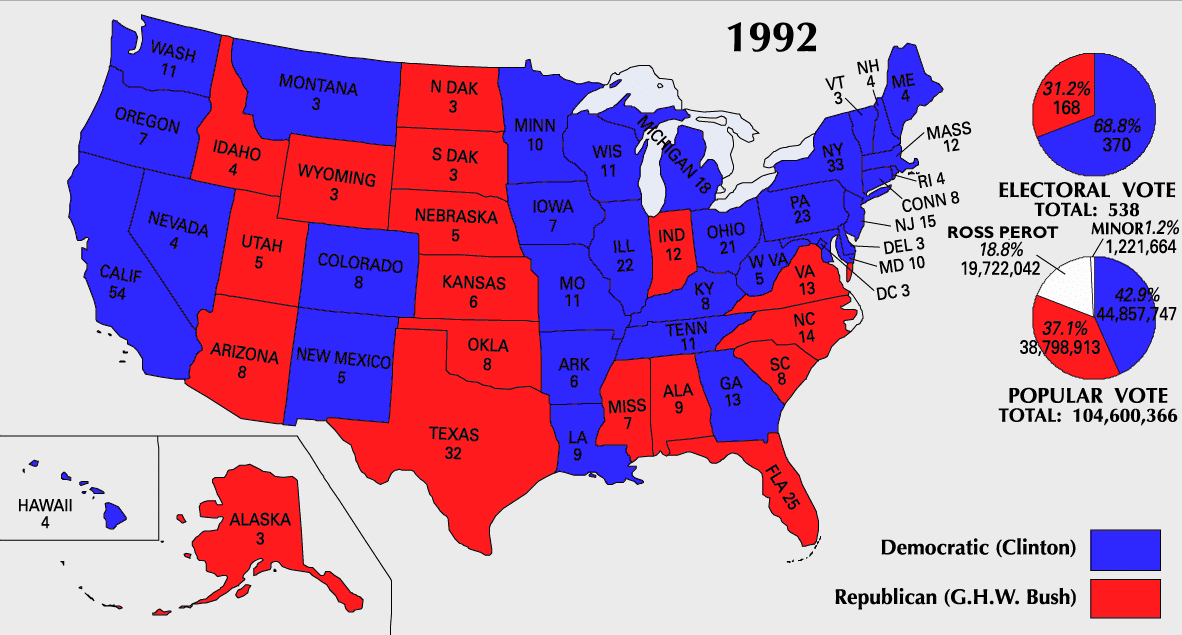The Presidential Election of 1992 was an unusual election for the presidency in that, for the first time since the election of 1912, there was a viable 3rd party.
Republican President George H. W. Bush had successfully navigated the country through the Persian Gulf War and the end of the Cold War. He was ushering in the first decade of peace and prosperity the nation had seen since the 1920s and 1930s. However, his popularity had dropped significantly since the end of the Persian Gulf War due to failing to keep a campaign promise of "No New Taxes."
Two other candidates would also enter the race. The Democratic nominee and an Independent. Both of which began polling ahead of the incumbent once the campaigns began.
The candidates were as follows:
Republicans: George H. W. Bush and Vice President Dan Quayle
Democrats: Bill Clinton and Vice President Al Gore
Independents: Ross Perot and Vice President James Stockdale
Platforms
Republicans: President Bush ran on his military record and his successful foreign policy while pointing out that Democratic candidate Bill Clinton had burned his draft card for Vietnam, protested the war, and would not be successful in foreign policy. Bush, for the most part, focused on his Democratic rival rather than the independent Ross Perot despite Perot polling higher than him.
Democrats: Bill Clinton ran on a balanced budget and also positioned him as a centrist. He chose Al Gore as his running mate, who was seen to be strong on Family Issues. With the economy faltering, Clinton specifically targeted key states and demographics, which seemed to aid him.
Independent: Ross Perot, the billionaire, came into the race as the lead candidate. Many disenfranchised Republicans and Southern Democrats liked his approach to the economy and his conservative values. His business sense resonated with many Americans who feared deficit spending, and he also argued against NAFTA, which he believed to be a terrible trade deal.
Outcome
Ross Perot grew frustrated during the election of 1992 and withdrew from his campaign, thus killing his chances for election when he jumped back into the race.
Clinton continued to surge in polls and was deploying a new technique in regards to ad spending.
In years past, the President nominees often spent most of their money on national advertising. However, the Clinton campaign spent most of their money on battleground states or swing states and local advertising. This allowed him to flip states that had gone Republican in the past.
There was also a key moment on the debate stage when Bill Clinton effectively communicated with a citizen who had dealt with unemployment. The empathy that he used resonated with the American people, while Bush came off as cold.
In the end, Bill Clinton successfully and surprisingly beat the once-popular incumbent Bush.
After the votes were tallied, it seemed as if Ross Perot had taken enough votes off of Bush to cost him the election of 1992. If Perot had not come back into the race, then there is a good chance that Bill Clinton would not have won. However, he went on to be the last president to balance the budget and would win a second term in the election of 1996.
Clinton's election was the first since the election of 1976 in which the Democrats were able to flip a few of the old Confederate southern states.

